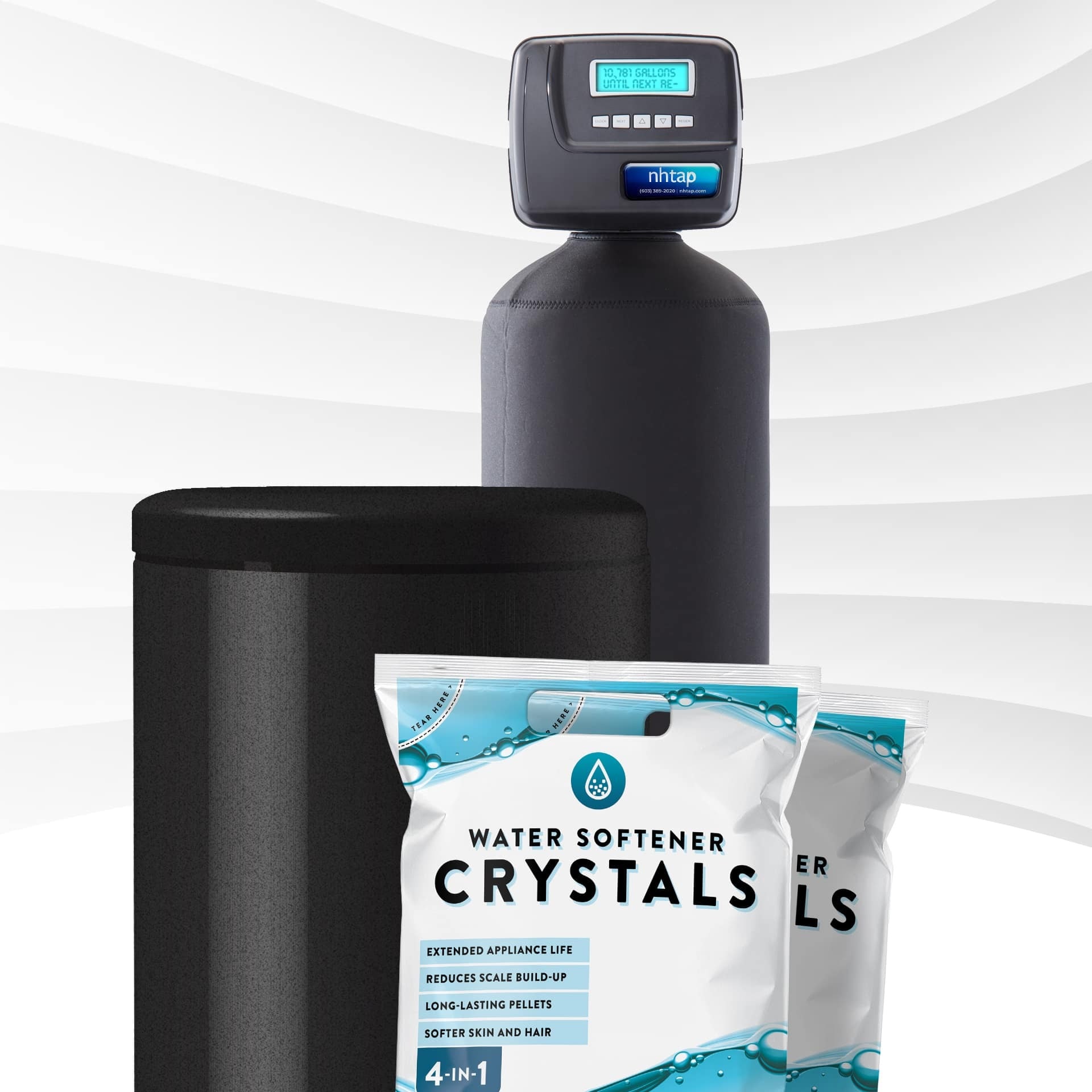Choosing the Right Water Softener: A Buyer’s Guide

If you want to know how to choose a water softener for your home or business, NH Tap is here to help! A good water softener helps to remove scale buildup, extend the appliance’s lifespan, conserve energy, improve water quality, reduce soap scum, improve the taste of the water, and even improve skin and hair health.
Our guide offers vital details for informed water softener purchases. Learn about types, features, installation, maintenance, and pricing to address your specific water hardness issues effectively and avoid uninformed choices.
Understanding Water Softeners
Water softeners reduce water hardness by passing it through a resin tank with sodium or potassium-coated beads. Calcium and magnesium ions in the water are attracted to the beads, while sodium or potassium ions are released. This process softens the water, enhancing soap and detergent effectiveness, reducing soap scum, improving skin and hair health, and enhancing taste. Hard water causes issues like scale buildup, reducing water flow, pipe clogs, and appliance damage.
Why You Need a Water Softener
Scale Prevention: Hard water can lead to scale buildup in pipes, faucets, and appliances. These deposits can clog pipes and damage appliances. A water softener removes the ions responsible for scale formation.
Extended Appliance Lifespan: Hard water can cause appliances to wear out more quickly due to scale accumulation. Water softeners help extend the lifespan of your appliances, saving you money.
Improved Cleaning: Softened water enhances the effectiveness of soaps and detergents as well as reduces soap scum, leading to cleaner dishes, clothes, and a more pleasant bathing experience.
Better Taste: Some individuals prefer the taste of softened water, as it lacks the mineral “hardness” that can affect the taste of beverages like tea and coffee.
Factors To Consider When Choosing a Water Softener.
To determine the appropriate water softener size for your home or business, an NH Tap Water Technician will follow these steps:
- Check your water hardness level from your local utility or using a testing kit.
- Calculate daily grain removal by multiplying daily water usage by hardness level.
- Decide regeneration frequency, typically every 3-7 days.
- Calculate weekly grain removal by multiplying daily removal by regeneration frequency.
- Choose a softener capacity (e.g., 24, 32, 40 cubic feet) matching or exceeding weekly grain removal needs.
- Consider occasional high water usage.
Water softeners can be categorized into two main types based on how they achieve water softening: salt-based and salt-free systems.
Salt-based softeners use a brine tank for effective hardness mineral removal, providing truly soft water while salt-free conditioners prevent scale buildup without removing minerals, offering lower maintenance and eco-friendliness.
Budget Considerations
Water softeners range from hundreds to over a thousand dollars, with reasonable maintenance costs. They extend appliance life and improve water quality. Larger budgets enable advanced features and capacities. Balancing budget and efficiency is vital for the right selection.
Water Softener Features
Digital Controls: These user-friendly interfaces allow you to program regeneration cycles, monitor system status, and adjust settings easily.
Bypass Valves: These valves enable you to divert water around the softener when it’s not needed, preserving softened water for essential use.
High-Efficiency Models: These reduce salt and water consumption by regenerating based on actual water usage.
Dual-Tank Systems: Ensure continuous soft water supply by using two resin tanks, alternating between them during regeneration.
**Self-Cleaning: Some systems automatically clean the resin bed, reducing maintenance needs.
Installation & Maintenance
The installation of a water softener typically involves connecting it to your home’s water supply, a drain for brine disposal, and a power source (if needed). NH Tap can ensure proper installation and ongoing maintenance.
Conclusion
When selecting a water softener, understand your needs, size requirements, and regeneration type. Compare popular brands and read reviews for informed decisions. Familiarize yourself with key features, installation, and maintenance for a well-rounded choice. Learn more by contacting us.
Frequently Asked Questions
What is a water softener?
A water softener is a device that reduces water hardness by removing calcium and magnesium ions, improving water quality.
What are the problems caused by hard water?
Hard water can lead to scale buildup in pipes and appliances, reduced soap effectiveness, dry skin, and damaged plumbing.
How do I choose the right water softener?
Consider water hardness, household size, and budget. Consult with professionals for accurate sizing and system recommendations.
Where can I find water softener systems near me?
A wide variety of water softener systems can be found here at NH Tap.
Return to Articles